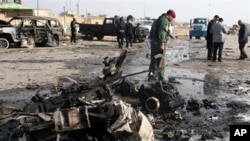A British-based group reports that the civilian death toll in Iraq for 2010 dropped to the lowest figure since the 2003 invasion of the country. The group, however, foresees a low-level of endemic violence that is likely to continue. Preliminary figures compiled by Iraq Body Count point to a civilian death toll of 3,976 as of December 25, compared to 4,680 in 2009.
Two-thirds of civilian deaths this year were caused by bombings attributed by authorities to sectarian and terrorist groups such as al-Qaida in Iraq, the report said. Actions by U.S. troops led directly to 32 civilian deaths this year, compared with 64 in 2009.
The overall civilian toll dropped by half in the first month after the United States declared the official end of combat operations in late August, and stayed at the lower levels through the end of the year.
Husham al Rikabi of Iraq's National Media Center tells VOA that the overall security situation in Baghdad and other parts of the country has been improving lately due to a number of high-profile arrests by security forces.
|
VOA's Steve Norman interviews Hamit Dardagan, co-founder of Iraq Body Count, on the latest finding:
|
Iraqi security forces have arrested several terrorist kingpins as well as dismantled al-Qaida networks active in Baghdad, Diyala, Anbar province and Mosul, he says. Rikabi also points out that security has improved in those areas due to the operations, and he thinks security forces will clean up remaining pockets of al- Qaida now that political leaders have finally formed a new government.
But Iraq Body Count notes that violence in Iraq was about the same during both the first and the second halves of 2010, suggesting the security situation is not improving.
Analysts point out that several high profile suicide operations this past week in the Anbar Province capital of Ramadi and in Mosul may suggest that a low-level of violence could continue in the country for the foreseeable future.
Iraq expert Peter Harling of the International Crisis Group in Damascus, nevertheless, believes that Iraq has come a long way since the dark days of 2006 and 2007 when sectarian violence reached new heights:
"Iraq has been recovering from what was a frightfully bloody conflict, particularly in 2006 and 2007, and the dynamics of that conflict have been shifting in ways which offer some measure of stability, of protection to civilians," Harling says. "You still have bombs being set off in Baghdad and, particularly, in other parts of the country, too, but this has nothing to do with the large scale civil war basically which was taking place in the capital and some other areas of the country in 2006 and 2007."
Harling also argues that using body count statistics to measure the state of the global security situation in Iraq is not necessarily a good barometer.
"I wouldn't stress the body count as the only metric which is pertinent in Iraq. The dynamics of the conflict have been shifting and this is a conflict which is far more political than it ever was. It's really measureable now in terms of what laws are being passed. In particular, in the field of oil legislation, reconciliation, the status of a town like Kirkuk, oversight over the security apparatus. All this requires qualitative more than quantitative metrics and I think it's time to move on, away from the body count," says Harling.
Iraq Body Count tallies deaths of non-combatants killed by military or paramilitary action and the breakdown of security following the invasion. The death figures come from cross-checked media reports, hospitals, morgues, non-governmental organizations and official figures.




